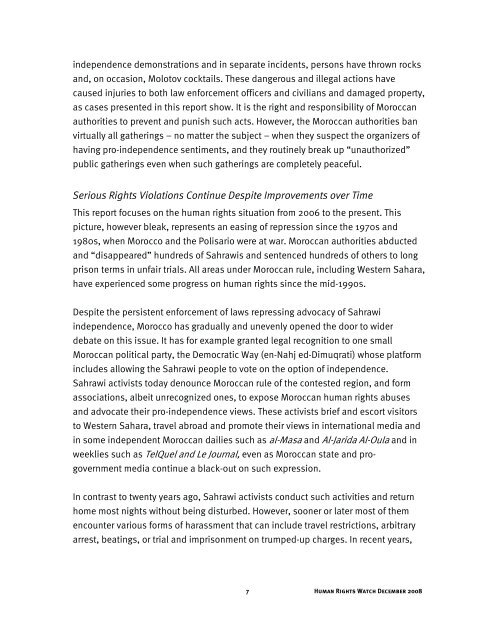Download full report with cover - Human Rights Watch
Download full report with cover - Human Rights Watch
Download full report with cover - Human Rights Watch
Create successful ePaper yourself
Turn your PDF publications into a flip-book with our unique Google optimized e-Paper software.
independence demonstrations and in separate incidents, persons have thrown rocks<br />
and, on occasion, Molotov cocktails. These dangerous and illegal actions have<br />
caused injuries to both law enforcement officers and civilians and damaged property,<br />
as cases presented in this <strong>report</strong> show. It is the right and responsibility of Moroccan<br />
authorities to prevent and punish such acts. However, the Moroccan authorities ban<br />
virtually all gatherings – no matter the subject – when they suspect the organizers of<br />
having pro-independence sentiments, and they routinely break up “unauthorized”<br />
public gatherings even when such gatherings are completely peaceful.<br />
Serious <strong>Rights</strong> Violations Continue Despite Improvements over Time<br />
This <strong>report</strong> focuses on the human rights situation from 2006 to the present. This<br />
picture, however bleak, represents an easing of repression since the 1970s and<br />
1980s, when Morocco and the Polisario were at war. Moroccan authorities abducted<br />
and “disappeared” hundreds of Sahrawis and sentenced hundreds of others to long<br />
prison terms in unfair trials. All areas under Moroccan rule, including Western Sahara,<br />
have experienced some progress on human rights since the mid-1990s.<br />
Despite the persistent enforcement of laws repressing advocacy of Sahrawi<br />
independence, Morocco has gradually and unevenly opened the door to wider<br />
debate on this issue. It has for example granted legal recognition to one small<br />
Moroccan political party, the Democratic Way (en-Nahj ed-Dimuqrati) whose platform<br />
includes allowing the Sahrawi people to vote on the option of independence.<br />
Sahrawi activists today denounce Moroccan rule of the contested region, and form<br />
associations, albeit unrecognized ones, to expose Moroccan human rights abuses<br />
and advocate their pro-independence views. These activists brief and escort visitors<br />
to Western Sahara, travel abroad and promote their views in international media and<br />
in some independent Moroccan dailies such as al-Masa and Al-Jarida Al-Oula and in<br />
weeklies such as TelQuel and Le Journal, even as Moroccan state and progovernment<br />
media continue a black-out on such expression.<br />
In contrast to twenty years ago, Sahrawi activists conduct such activities and return<br />
home most nights <strong>with</strong>out being disturbed. However, sooner or later most of them<br />
encounter various forms of harassment that can include travel restrictions, arbitrary<br />
arrest, beatings, or trial and imprisonment on trumped-up charges. In recent years,<br />
7 <strong>Human</strong> <strong>Rights</strong> <strong>Watch</strong> December 2008


